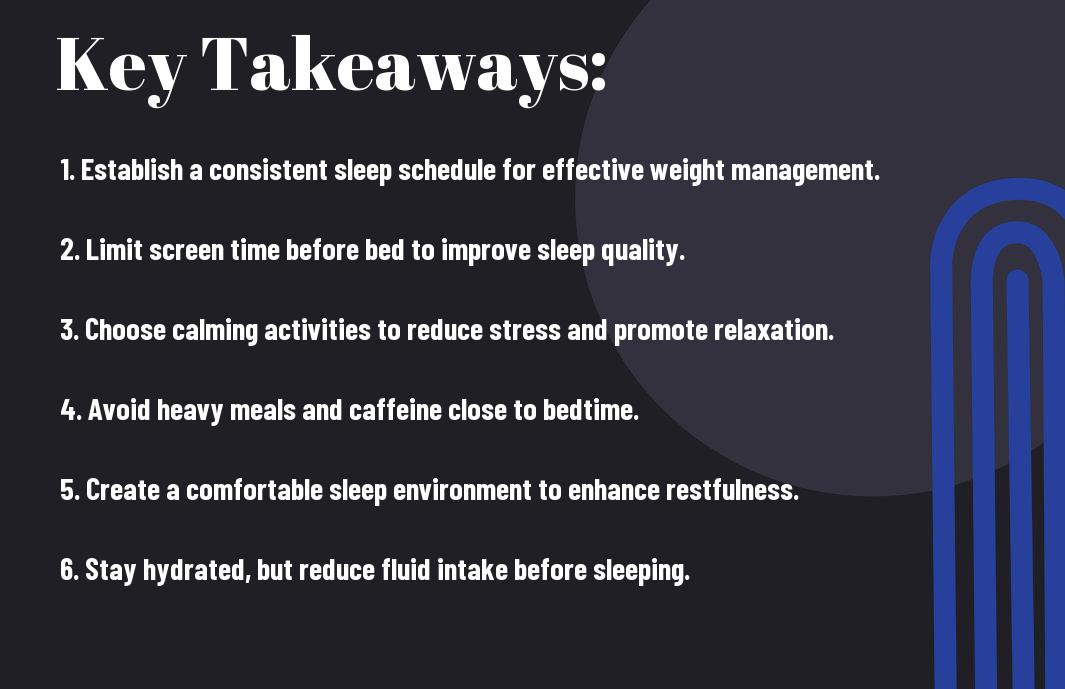With the right bedtime routine, you can significantly enhance your weight loss journey. Establishing healthy habits before sleep can improve the quality of your rest, regulate your metabolism, and curb late-night cravings. This informative guide will provide you with practical tips designed to help you create a bedtime routine that supports your weight loss goals, making it easier for you to wake up rejuvenated and ready to take on the day.
Key Takeaways:
- Establish a Consistent Sleep Schedule: Going to bed and waking up at the same times can enhance sleep quality and support weight loss efforts.
- Create a Relaxing Environment: Design your bedroom to be calming and conducive to sleep, using dim lights, comfortable bedding, and minimal noise.
- Avoid Late-Night Snacks: Eating before bedtime can disrupt sleep and trigger unnecessary calorie intake; opt for a light snack if needed.
- Limit Screen Time Before Bed: Reducing exposure to screens at least an hour before bedtime helps improve sleep quality by minimizing blue light exposure.
- Incorporate Relaxation Techniques: Engage in activities like reading, meditation, or gentle stretches to ease your mind before sleep.
- Stay Hydrated, But Not Too Much: Drink enough water throughout the day, but limit intake before bed to prevent sleep interruptions.
- Plan for Tomorrow: Take a few minutes before sleep to prepare for the next day, which can reduce stress and improve sleep quality.

Understanding the Importance of Sleep for Weight Loss
Your body needs adequate sleep to effectively manage weight. Quality sleep plays a significant role in regulating hormones related to hunger and appetite. When you prioritize rest, you set yourself up for better decision-making regarding food choices and portion control. Insufficient sleep not only affects your energy levels but can also lead to a sluggish metabolism, making weight loss even more challenging. By focusing on your sleep habits, you are taking a positive step towards your weight loss goals.
The Role of Sleep in Metabolism
For optimal metabolism, getting enough sleep is vital. During sleep, your body undergoes various repair processes and hormone regulation, which can impact how efficiently your body burns calories. Lack of sleep can slow your metabolic rate and hinder your ability to lose weight, as energy expenditure is closely tied to your sleep patterns. Ensuring you get a good night’s sleep helps maintain a healthy metabolism, supporting your weight loss efforts.
Effects of Sleep Deprivation on Cravings
One significant consequence of inadequate sleep is an increase in cravings for unhealthy foods. When you’re sleep-deprived, your brain’s reward centers become more active in response to food stimuli, pushing you to reach for high-calorie options. This often leads to impulsive eating decisions that can derail your weight loss journey, making it important to recognize the connection between sleep and food choices.
Deprivation of sleep not only amplifies your cravings but also disrupts the balance of hormones that control appetite. Ghrelin, the hormone that stimulates hunger, increases, while leptin, the hormone that signals fullness, decreases. This imbalance can trick your body into feeling hungry even when it doesn’t need food, leading to overeating and poor dietary choices. By understanding this connection, you can be more mindful of your sleep habits and how they influence your cravings and dietary decisions.

Establishing a Consistent Sleep Schedule
Some people find that establishing a consistent sleep schedule can significantly enhance their weight loss efforts. By going to bed and waking up at the same time every day, your body’s internal clock can regulate more effectively. This consistency helps improve sleep quality, boosts metabolism, and supports hormone balance, ultimately aiding in weight management. A regular schedule allows you to sleep soundly, ensuring you wake up refreshed and energized for the day ahead.
Benefits of a Regular Sleep Pattern
Below are some key benefits of maintaining a regular sleep pattern that can assist you in your weight loss journey:
- Improved metabolism and energy levels
- Enhanced mood and reduced stress
- Better appetite regulation, helping prevent late-night snacking
Tips for Sticking to a Schedule
For better adherence to your sleep schedule, consider implementing these helpful strategies:
- Limit screen time at least an hour before bedtime
- Create a calming bedtime routine
- Avoid caffeine or heavy meals close to bedtime
Any combination of these tips can help you cultivate a more disciplined sleep regimen, making it easier to stick to your goals.
It’s important to create a conducive sleep environment to aid your routine. Ensure your sleeping space is dark, quiet, and cool, allowing your body to relax fully. You can also set reminders or alarms to signal bedtime and wake time, helping solidify your new schedule in your daily life.
- Consider keeping a sleep diary to track your progress
- Gradually shift your schedule by 15 minutes if needed
- Stay consistent, even on weekends
Any adjustments you make with consistency can lead to long-term success in maintaining your sleep schedule.
Creating a Relaxing Sleep Environment
Not only does a calming atmosphere prepare you for restful slumber, but it also enhances your weight loss journey. Transform your space into a sanctuary by removing distractions and creating a serene ambiance. For more insights on optimizing your nighttime habits, check out How to Build a Better Bedtime Routine for Adults.
Ideal Bedroom Setup
Beside the vitals of a comfortable mattress and pillow, consider decluttering your bedroom to promote a tranquil mindset. Soft, breathable linens and soothing colors can further enhance your relaxation. Aim for a setup that invites you to unwind and recharge adequately.
The Impact of Light and Noise
An ideal sleep environment minimizes disruptions, particularly from light and noise. Exposure to bright screens or outside lights can confuse your internal clock, making it harder to fall asleep. Consider blackout curtains and a white noise machine to maintain a peaceful atmosphere for restorative rest.
Relaxing your mind before bed is vital for achieving quality sleep. If external noise is an issue, soft sounds can drown out distractions, while complete darkness signals your body that it’s time to rest. Reducing light exposure, particularly blue light, enhances melatonin production, helping you drift off more easily. Incorporating these strategies into your bedtime routine can significantly improve your sleep quality and support your weight loss goals.
Evening Habits to Support Weight Loss
After a long day, it’s important to wind down with evening habits that foster weight loss. Incorporating small, sustainable changes can significantly impact your progress. For instance, integrating routines such as planning healthy meals or practicing relaxation techniques can aid your journey. Explore more about these effective practices with this guide on 15 Evening Routines That Accelerate Weight Loss Overnight.
Healthy Snacks Before Bed
Evening snacks can be part of your weight loss strategy if chosen wisely. Opt for healthy options that will satisfy your cravings without adding excess calories. Healthy snacks like Greek yogurt, a small portion of nuts, or sliced fruits can provide nutrition and prevent late-night bingeing, setting you up for success the next day.
Activities to Wind Down
Snacks alone won’t prepare your body for restful sleep; how you spend your evening matters too. Engaging in calming activities such as reading, meditation, or gentle stretching can help lower stress levels and regulate your emotions, making it easier to stick to your weight loss goals. Creating a peaceful atmosphere before bed encourages a more restful night and enhances your overall well-being.
But ensuring a balanced wind-down routine is just as important as the snacks you choose. By prioritizing calming activities, you’re signaling to your body that it’s time to relax, which can lead to better sleep quality. Good sleep can impact your weight loss efforts by regulating hormones that control appetite, allowing you to make healthier choices the next day.

Incorporating Mindfulness and Relaxation Techniques
Unlike traditional winding down routines, incorporating mindfulness and relaxation techniques can significantly enhance your weight loss journey. By focusing on calming your mind and body before bedtime, you promote better sleep quality, which is imperative for weight management. Techniques like meditation and deep breathing help reduce stress levels, leading to lower cortisol, a hormone linked to weight gain. Establishing a nightly routine that includes these practices can set the stage for healthier choices the next day.
Benefits of Meditation and Deep Breathing
By engaging in meditation and deep breathing exercises, you can experience a host of benefits that support your weight loss efforts. These techniques not only lower stress but also improve emotional regulation and enhance your overall well-being. With regular practice, you will notice greater clarity in decision-making and a stronger commitment to healthy lifestyle choices, ultimately aiding your weight loss journey.
Journaling for Better Sleep
One effective method to enhance your sleep and weight loss is journaling. This practice allows you to reflect on your day, jot down thoughts or concerns, and outline your goals, providing a sense of closure to the day’s events. By dedicating a few moments to write before bed, you create a mental space that fosters relaxation and prepares your mind for restful sleep.
Consequently, journaling not only helps clear your mind of the day’s clutter but can also shed light on patterns in your eating habits and emotions tied to food. By tracking your feelings or moments of stress, you can develop strategies to manage them, which is vital for maintaining a weight loss-focused mindset. Writing about your achievements and goals further solidifies your commitment to healthy choices, making it easier to align your actions with your aspirations.

Physical Activity and Its Timing
Keep in mind that the timing of your physical activity can significantly impact your weight loss goals. Engaging in routine exercise not only boosts your metabolism but also supports better sleep. Consider incorporating tips from 6 Sleep Habits That Can Help You Lose Weight to maximize your efforts.
Best Times for Exercise
Across the day, it’s important to find the best times for your workouts that suit your schedule and energy levels. Morning workouts can energize you for the day, while evening sessions provide stress relief after a long day. Ultimately, consistency is key, so choose what fits your lifestyle.
Balancing Intensity and Relaxation
Best practices in your bedtime routine should include a balance between high-intensity workouts and calming activities. Finding the right mix will help you feel invigorated and relaxed as you prepare for sleep.
Intensity in your workout is important for weight loss, but incorporating relaxation techniques allows your body to recover and prepare for restorative sleep. Consider integrating yoga, stretching, or gentle walks into your routine after intense sessions. This balance supports your overall well-being and can enhance your sleep quality, which in turn assists in achieving your weight loss goals.
Conclusion
Considering all points, establishing a weight loss friendly bedtime routine can significantly impact your overall health and fitness journey. By prioritizing sleep, minimizing screen time, and creating a relaxing environment, you can enhance your body’s recovery and metabolism. Additionally, incorporating calming activities like reading or meditation can help reduce stress, which plays a role in weight management. This combination not only paves the way for more effective weight loss but also contributes to your overall well-being, ensuring you feel your best both physically and mentally.
FAQ
Q: Why is a bedtime routine important for weight loss?
A: A consistent bedtime routine can help regulate your sleep patterns, which is necessary for maintaining a healthy metabolism. Quality sleep supports hormonal balance, helping to control hunger hormones like ghrelin and leptin, making it easier to resist unhealthy cravings and manage your weight effectively.
Q: What activities should I include in a weight loss-friendly bedtime routine?
A: Your bedtime routine can include relaxing activities such as reading a book, practicing meditation or deep breathing exercises, gentle stretching or yoga, and preparing a healthy snack if needed. Limiting screen time and engaging in calming activities can also help signal to your body that it’s time to wind down.
Q: How can I manage nighttime cravings while on a weight loss journey?
A: To combat nighttime cravings, focus on having a healthy dinner that includes balanced proteins, fats, and fiber. If you feel hungry later, consider having a small snack like Greek yogurt or a piece of fruit. Staying hydrated throughout the day can also prevent unnecessary snacking at night.
Q: What time should I aim to go to bed for weight loss benefits?
A: Aiming for 7-9 hours of sleep is ideal, and determining your bedtime should depend on your wake-up time. For example, if you need to rise at 6 AM, try to be in bed by 10 PM. Consistency in your sleep schedule is important, so try to go to bed and wake up at the same time every day.
Q: How does screen time before bed affect weight loss?
A: Exposure to blue light from screens can interfere with your body’s natural sleep-wake cycle by suppressing melatonin production. This can lead to impaired sleep quality, making it harder to manage weight. It is advisable to limit screen usage at least an hour before bed to improve sleep quality and support weight loss efforts.
Q: Should I avoid eating before bed completely?
A: While it’s not necessary to avoid eating altogether, it’s important to choose healthy, light snacks if you feel hungry. Foods that are high in protein or healthy fats, such as nuts or yogurt, can be beneficial. Just be mindful of portion sizes to avoid excessive calorie intake before sleep.
Q: Can bedtime routines impact morning energy levels?
A: Yes, a well-structured bedtime routine can significantly enhance your sleep quality, which in turn affects your energy levels the following day. Consistent and restorative sleep can lead to improved mood, better workout performance, and more motivation to maintain healthy eating habits, all of which contribute positively to weight loss.





